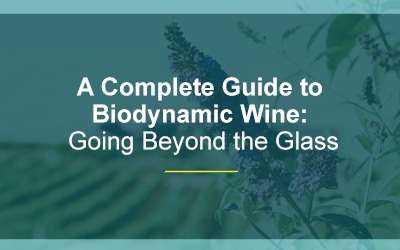
Wine quality is determined from the ground up, and the priorities of biodynamic wine mirror that reality with its heart in the soil and faith in the earth.
And that faith is warranted! Agriculture has sustained civilizations over hundreds of thousands of years often only to fail when humans end up meddling too much in the wrong ways, too focused on manufacturing and manipulating the end product—the classic case of fatal hubris.
If our goal is to produce the highest quality harvest and sustain our practices for the long haul, we have to work with the land. It’s pretty amazing what the earth is capable of creating if we let it. Grapes are no exception.
When we set out looking for biodynamic wine, we are looking for that “we’re making wine now and forever” vineyard that is giving us the quality wine only the earth itself can create. That’s why we’ve put together this comprehensive guide to biodynamic wine and farming practices, with everything you need to know before you pop the cork.

Meet Our Partner: Brooks Wine
Brooks Wine believes making exquisite wine is more than an art, it is an act of stewardship and deep honor for the Earth, its peoples, and the connection between the two.
Brooks Wine believes making exquisite wine is more than an art, it is an act of stewardship and deep honor for the Earth, its peoples, and the connection between the two.
As a certified Biodynamic vineyard, Brooks works to maintain the delicate balances of nature and tend to all aspects of their vineyard, from the tiniest insect to the grapes themselves. They’ve cultivated a self-sustaining ecosystem with a diverse cast of plant and animal species in lieu of additives and harmful pesticides.
As part of their commitment to nature, they use only natural ingredients and practices throughout their entire winemaking process. As a Certified B Corp, Brooks’ commitment extends to every piece of their business, ensuring the production of their top-rated wines is one that is good for the taste buds, the environment, and the community.
Check out our friends at Brooks Wine, or learn about other Grow Ensemble partners here.
What is Biodynamic Wine?
Biodynamic wine is the product of winemaking with the lowest intervention possible. That means no chemicals to artificially nourish the soil, no pesticides for short-term crop defense, and no additives for post-harvest “corrections.” Biodynamic wine is the result of farming that encourages balanced and resilient land that is at its best without manipulation.
But of course, wine doesn’t occur in natural springs (we wish!). To produce their vino, biodynamic winemakers focus on setting the stage with biodynamic farming techniques. These techniques create a self-sustaining, biodiverse ecosystem that fosters lush soil, healthy vines, and the highest quality grape the land can muster.
Viticulturists’ diligence in tending to the land results in premium quality raw materials that don’t require the same manipulation necessary on conventional vineyards to achieve a great(er) taste.
There is a lot to appreciate in the world of biodynamic wine, and it all starts with understanding where it comes from, how it works, and why it simply makes sense. Like many others, we continue to learn our way around biodynamics from Oregon-based Brooks Wine. For over two decades, they’ve invested their time and energy into biodynamic agricultural practices to lay the groundwork for healthy grapes, happy land, and satisfied wine drinkers. Brooks’ commitments to people and environment only make their award-winning wine that much more delicious.
Certifications
There are a couple of biodynamic certifications you might see on your wine bottle: “Made with Biodynamic Grapes” means the grapes are grown using biodynamic farming, but some intervention in the winemaking process is permitted.
The other certification is the Demeter symbol (sounds like ‘DIM-itter’), which means no intervention and one hundred percent biodynamic practices from soil to bottle. This is what you’ll find on a Brooks bottle.
Why does this certification matter? Well, most simply, it makes it easy for us. You may have seen us mention a time or two, or ten, why we appreciate third party certifications like B Corp Certification.
The same is true for wine. We can’t all peruse each vineyard to see first hand what kind of farming practices they use (although if you need a gift for a wine lover, that’s a great treat to offer).
Certifications also provide consistent standard buyers can rely on. Labelling laws vary from state to state muddying the waters for many labels we recognize on our wine.
For example, if a bottle says “Pinot Noir” and it is from California, state law only actually requires it to be 75% pinot noir. Oregon, the strictest on labelling, requires it to be 95%. This is why we appreciate when a winemaker, like Brooks, guarantees that every bottle of wine is 100% the varietal it is labeled as.
What we like about the Demeter symbol is that it provides the third-party verification that biodynamic practices are used growing and harvesting the grapes, and that land and crop integrity is scrupulously preserved throughout the winemaking process.
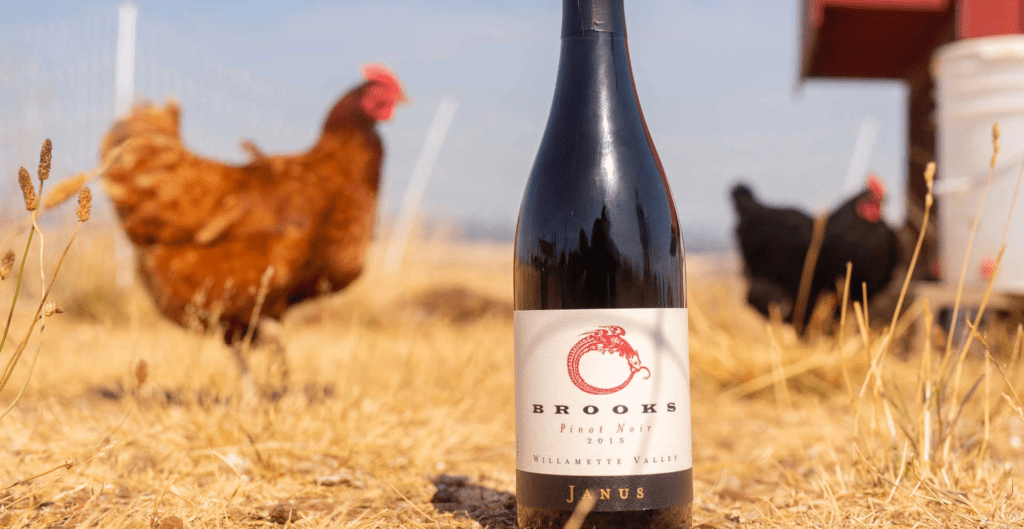
The history and winemaking philosophy behind biodynamic wine
Biodynamic winemakers think about their vineyard in relation to the planet as a whole. These growers integrate the spiritual, ethical, and ecologically friendly ethos of biodynamics as cooked up by Austrian philosopher Rudolf Steiner in the 1920s, predating the organic movement.
The method rose to prominence through the decades, championed in the wine space by the Loire valley vineyard owner, Nicolas Joly, who became one of the pioneers and leading personalities of the biodynamic wine movement in the 1980s
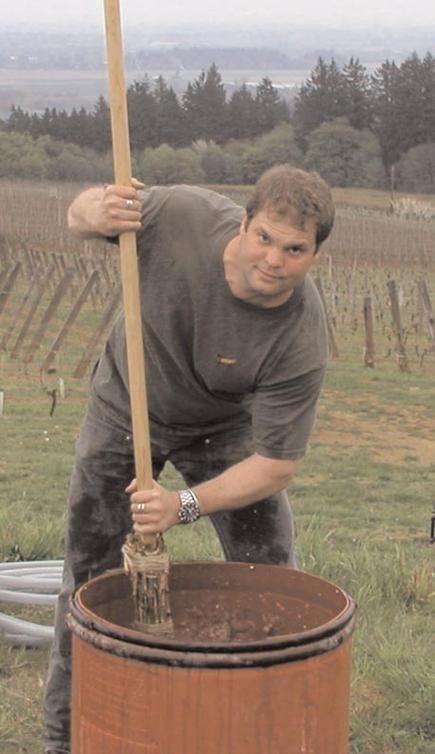
Winegrowers like Jimi Brooks were likewise inspired by the technique, uncompromisingly dedicated to making wine in the way he thought best for the land, best for the grapes, and best for the wine. Nearly two decades after Jimi’s unexpected passing, his family and friends continue to honor his vision on the Brooks vineyard.
Biodynamic winemaking and its holistic approach to wine is intended to make for a unique and impactful process, just like Jimi Brooks imagined when he started Brooks Wine.
The philosophy emphasizes on what the land can do, not what we can do with it; it focuses on contributing to the land, not exploiting it; and it trusts that attention to every aspect big and small in the complex agricultural process allows for the greatest results.
Practically this involves collaborative scheduling, natural minerals, soils and composts, animals to fertilize, and a close relationship with the crops, all aiming to leave the land in as good, if not better, condition—you can’t talk biodynamics without talking about the superpowers of biodiversity. This truly sustainable approach makes a rich, fertile environment for vines to safely and strongly grow.
Tasks on a biodynamic farm are regulated by the biodynamic calendar, with certain days for planting, watering, and harvesting. Throughout all of this, no chemicals, pesticides or herbicides are added, and following harvest, no foreign agents are added to the wine, meaning that everything in your glass is a naturally occurring element of the winemaking process.

But, but, but…how is wine made without these traditional practices, you may ask?
Well, take insect infestation—a common battle for farmers that often involves chemical pesticides and insecticides. These tactics are a no-go in biodynamic farming. Instead, the Brooks team plants diverse botanical species around their vineyards to decrease the crops’ vulnerability to disease and infection, therefore naturally increasing their resilience.
Another example: irrigation. While many farms use sprinkler systems that can be inefficient with their use of water and energy, biodynamic farmers are able to reduce watering because the rich soil retains more rainwater to hydrate those thirsty vines.
The philosophy and its practices carry into the winery as well, of course. As required for any winemaker boasting the Demeter biodynamic certification, there’s no adding of sugar or sulfites, unlike with traditional winemaking. Instead, Brooks respects the natural flavor of biodynamic grapes, which are delicious because they’ve been exceptionally well cared for throughout the biodynamic process.
When balance requires some adjustment, they rely on blending instead of artificial intervention. These winemakers are experts in their art and, quite fittingly, grapes are their tool of choice.
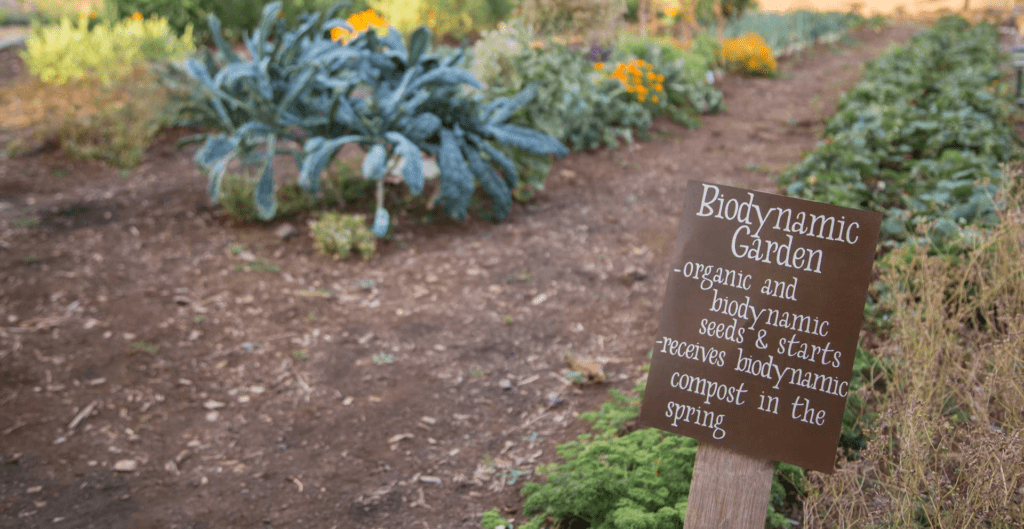
What You’ll Find on a Biodynamic Vineyard
What you’ll find on a biodynamic vineyard is a lot less than on a regular one. The low-intervention strategy of biodynamic wine practices means that excess tools and machinery are banished to make way for some other important elements…
Biodiversity
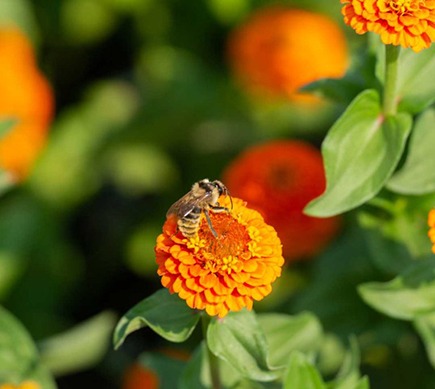
To become a certified biodynamic farm, at least 10% of the land must be untouched and uncultivated to allow wildlife to flourish.
Biodynamic producers treasure their naturally occurring grasslands, wetlands, and forests because the ecosystems that thrive within them keep both the farm and planet healthy.
You’re also likely to see farm animals like cows and chickens roaming free range. Their manure is used for fertilization and composting at various stages of the process.
Compost
If you aren’t already familiar with the benefits of composting, we recommend a quick refresh. This is the special sauce of any agriculture operation.
Essential to biodynamic methods is a healthy batch of compost. Many chemical fertilizers use nitrous oxide, which is 294 times more damaging to the planet than carbon dioxide, and it still doesn’t have the power of a well-curated compost pile. So it’s no wonder that conscientious farmers are nixing the synthetic stuff for the au naturale alternative.
Compost recipes combine from-the-earth ingredients like plant materials and manure from the free-range cows and horses.
Brooks uses a combination of cow manure, hay, and ground wood chips with some specific tweaks known to stimulate and nourish their vines.
Natural bacteria causes the compost mixture to decompose, releasing heat which concentrates at the center of the pile, and the heat makes the magic happen. That’s why it’s essential to turn it regularly for an even consistency if your preparation is in a bin or a growing pile in your backyard.
Brooks generously indulged the home gardener FAQ and shared all about the Brooks compost concoction for all to model…thank you, friends.
A Cow Horn
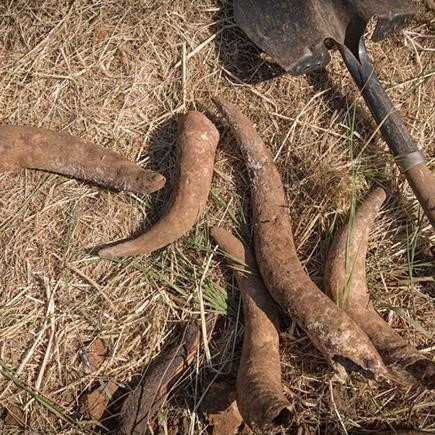
When the compost is fully decomposed, and all that’s left is a pile of nutritious plant decadence, biodynamic farmers add a ‘preparation’ to intensify the stimulating effect on plants.
One such biodynamic preparation is to pack cow manure into horns and bury them underground for the winter. When they’re dug up in the spring, the manure is diluted with water and either sprayed over the soil directly or added to the compost.
A favored preparation at Brooks is to ferment camomile flower heads in the soil. This has the effect of stabilizing nitrogen within the compost and increasing the soil life, ultimately stimulating plant growth. These people take soil seriously because they take wine seriously, and the two are simply inseparable.
Lunar Calendar

When we say biodynamic winemaking approaches farming holistically, we mean holistic. Rudolf Steiner believed that since plants react to every aspect of their environment, everything in farming should likewise consider each component, all the way to the moon and back. So, part of Steiner’s biodynamic philosophy involved farming in sync with the lunar calendar.
This schedules planting, pruning and harvesting according to the moon’s cycles in order to harness nature’s energy and rhythms.
Steiner’s belief was that the shrinking moon pulled energy down and inward, priming the preparation and strengthening phase of the plant cycle, making it a good time for farmers to plant and prune their crops.
That’s why biodynamic farmers aim to sew seeds just before a full moon—to take advantage of the maximum number of waning moon days. Conversely, the growing moon pulls energy up and out of the ground, making it the ideal phase for harvesting.
This philosophy goes further, dividing days into four categories—fruit, root, leaf, and flower—that instruct farmers which days to work on which types of crops, based on moon phases. The idea is that the passage of the moon in front of the constellations acts as a ‘lens’ that emphasizes the effects of the moon on different parts of the plant.
These phases typically last for 2-4 days, and rotate sequentially throughout the year, ensuring all elements of the plant get the same amount of attention for a balanced approach to farming.
With this level of attention to detail, you can understand how these winemakers are able to rely on the integrity of the grape without traditional intervention!
People
You may find even more people than usual on biodynamic vineyards, as the low-intervention approach often necessitates greater levels of well-trained, hands-on farming. Extra pairs of hands ensure that no unnecessary resources are used or wasted in pursuit of a delicious grape.
This is where additional certifications that care for workers’ rights come in. Brooks’ philosophy that if you take care of people, they’ll take care of you underlies their B Corp certification, and even further their active 1% for the Planet commitment.
A new regenerative agriculture certification (Regenerative Organic Certification™) touches on these same principles as well tackling these issues through a three-pillar approach.
Biodynamic Wine FAQs
Is biodynamic wine better for you?
A few things to consider here. Biodynamic wine’s low intervention core means organic, with no chemical and GMOs in the process. Just as that saves the crops and the land they grow on, it means those synthetic additives aren’t coming with the bottle into your home.
Beyond the immediate, biodynamic farmers’ efforts are centered about the healthiest environment possible, which is better for all of us. Their farming practices operate to positively affect the environment. Wild concept, huh?
The strong link between climate change and agriculture means this impact extends beyond a single bottle, harvest, or vineyard. The holistic approach to caring for the soil and the land can make it more biodiverse and nutrient-rich in the long-run, meaning more carbon sequestering power and reduction in greenhouse gasses.
So, buying from a biodynamic vineyard means, with glass in hand, you’re supporting the fight against climate change. Sounds better to us.
Does biodynamic wine taste different?
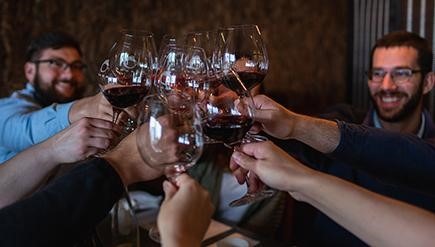
Great quality biodynamic wine means great quality wine. You won’t be able to tell from taste whether or not a wine is biodynamic across the board, but what you will experience is a flavor that is rooted in the land that grew the grapes.
Having said that, expert winemakers have told us that when their team does blind taste tests from their vineyard, the wines from their biodynamic grapes consistently come in as their team’s winning choice, so a trained palate may argue you can taste the difference for the better.
All wines reflect the terroir, growing conditions, and skill of winemakers, but this is even more apparent for biodynamic wines. The healthier soil encourages more expansive roots so the vines can suck up extra nutrients for a full flavor of the land.
Plus, biodynamic grape growers choose the grape most suited to the soil they have. Each grape gets a custom experience, fit and tailored to the right soil and placement. Like the team at Brooks chose their pinot noir and riesling specialties based on their locale, they investigated each of their sites for soil type, sun exposure, rainfall, and wind to pair each plot with the perfect grape for happier vines.
Top of the line wine in the bottle means these little grapes need royal treatment right out of the gate.
If you’d be curious to see what the experience of Grow Ensemble Co-Founders, Annie and Cory, was in tasting Certified Biodynamic Wines, watch the video below:
Is biodynamic farming the same as organic farming?
Nope. Both biodynamic and organic grapes are free from synthetic pesticides and herbicides, but this is where the similarity ends.
Organic wine permits added sulfites and yeast too. So while organic wine is a step in the right direction, with fewer chemicals than regular wine, biodynamically produced wine is organic and goes a step further by eradicating synthetic agents and additives, and taking that holistic approach to the process we’ve talked about.
How Common is Biodynamic Wine?
Including Brooks, there are over 700 wine producers worldwide and more than 80 Demeter-certified wineries in the United States, with a high concentration in California’s Sonoma Valley.
The U.S. has the third highest number of certified vineyards, behind France and Italy, so it shouldn’t be hard to get your hands on some!
How can you tell if a wine is biodynamic?
- First things first: look for the logo. Biodynamic wine can be certified by either Demeter or Biodyvin. Certified vineyards like Brooks will often show one of these two logos on the label.
 Tip
Tip
Check if it’s biodynamic wine or ‘wine made with biodynamic grapes’. The latter means that unlike authentic biodynamic wine, there’s no assurance the grapes were manipulated at a later stage with foreign agents.

- Learn about the vineyard. Some winemakers follow biodynamic practices but aren’t certified or don’t mark their bottles. This might be because they don’t want their bottle put in a specific organic section in stores or other considerations like the financial implications to certification. It’s an easy decision when the winemaker puts it right there on the label for you, but keep in mind, this kind of winemaking is still adopted by only a tiny portion of today’s vineyards, with understanding of the methodology still growing with the practices. So it can be helpful, if you have the opportunity, to learn about a few vineyards that you may want to buy from to really understand what’s behind those grapes. If you’re going beyond a third-party certification, make sure you know your stuff!
- Ask! Ask your sommelier or wine merchant for a biodynamic wine, and they should be able to point you in the right direction. Even if they don’t stock any wines with biodynamic certification yet, simply asking will make them more likely to add some to their list.
- Shop direct from a certified vineyard. Once you find a winemaker you know and trust, visit them directly either on a tour, tasting, or online. Like you can find at Brooks, these vineyards are doing the good work and are eager to share. They’ll guide you through their wide range of varietals to cater to different palettes, occasions, and pairings from pinot noir to a renowned Riesling.
Top us off!
The wine world can seem like a foreign universe with different language, unique norms, and a lot of details. Biodynamic wines, however, get to the root of the subject. Literally. The road to superb wine is paved with rich soil and cover crops.
With its pro-planet outlook and ethical approach, biodynamic winemakers ensure we have full glasses long into the future. Biodynamic wine offers a great taste and a warm glow thanks to its conscientious production down to the last drop.
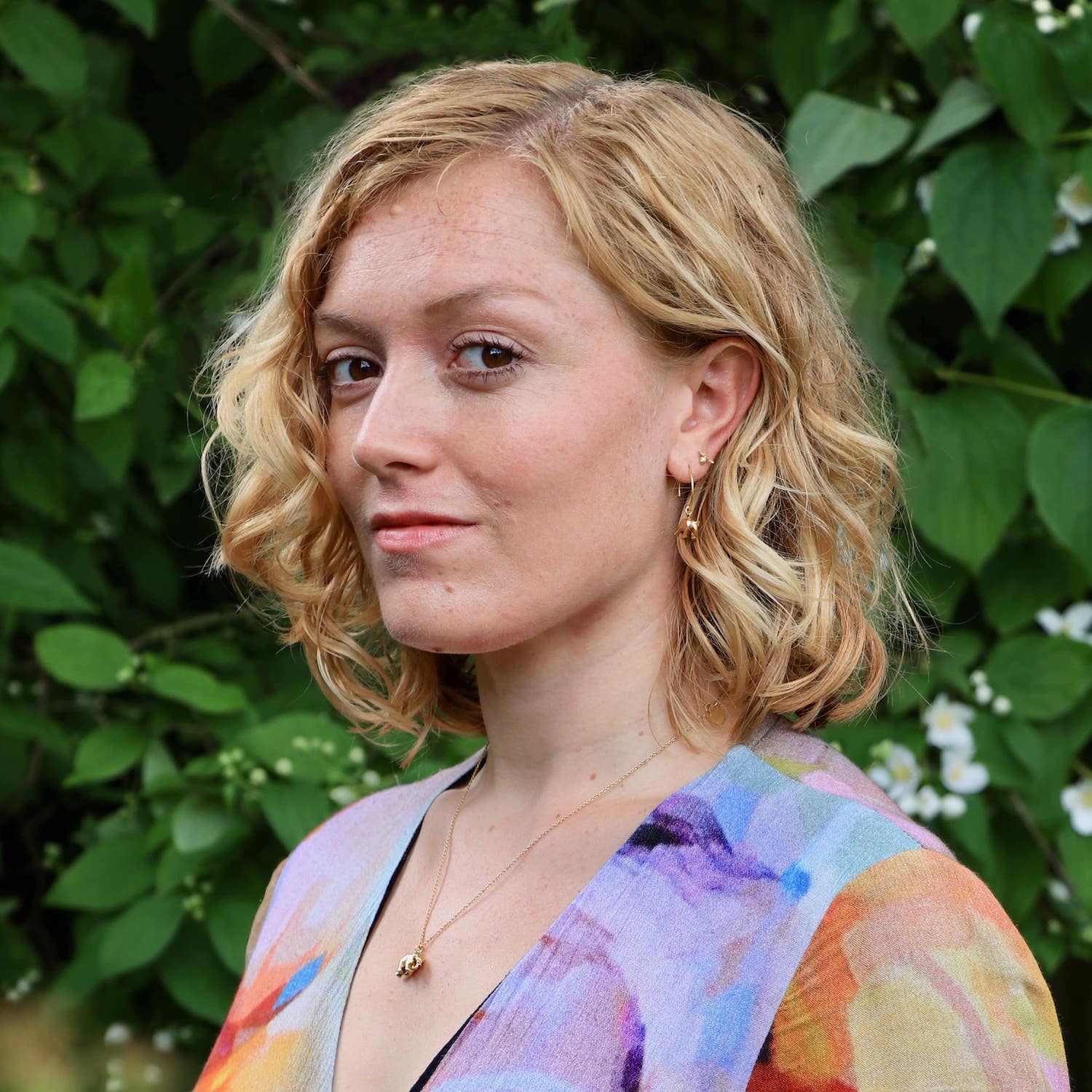
Cressida Peever
Contributor
Cressida is a British writer originally from Oxfordshire, and now based in London. She studied at Durham University and the University of Oxford. She loves theater, cats, and growing runner beans (but not all at the same time).




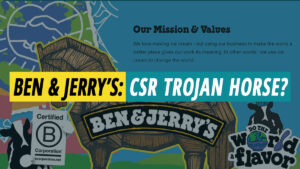

Leave a Reply